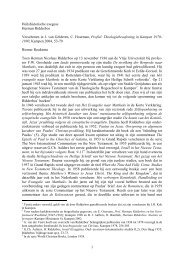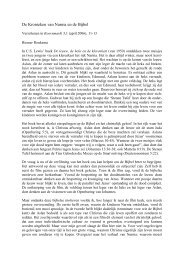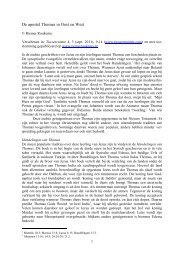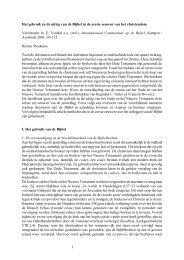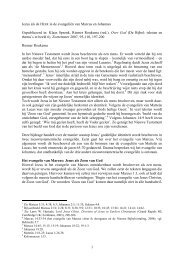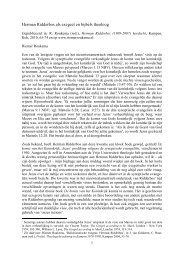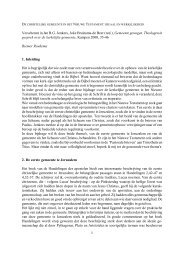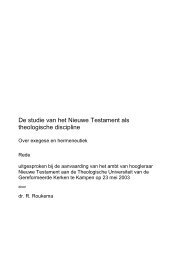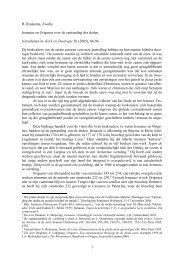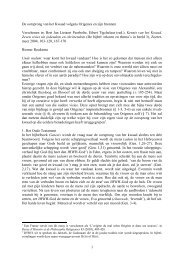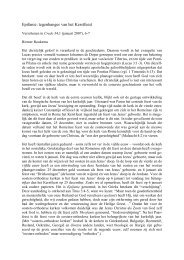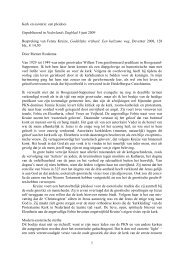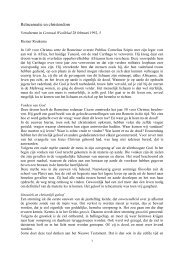Herman Ridderbos‟s Redemptive -historical ... - Riemer Roukema
Herman Ridderbos‟s Redemptive -historical ... - Riemer Roukema
Herman Ridderbos‟s Redemptive -historical ... - Riemer Roukema
You also want an ePaper? Increase the reach of your titles
YUMPU automatically turns print PDFs into web optimized ePapers that Google loves.
However, not all Reformed theologians shared Grosheide‟s rejection of the<br />
redemptive-<strong>historical</strong> interpretation of Scriptures. Tjeerd Hoekstra, Practical Theology<br />
professor at Kampen, candidly spoke of “the redemptive history of the Old<br />
Testament” when discussing the historia revelationis in his “Reformed Homiletics”.<br />
36 A very important figure in this respect is Klaas Schilder, who in 1934 became<br />
Dogmatics and Ethics professor at Kampen. Even as a minister of religion he had<br />
started around the year 1930 to criticize the “exemplary sermons” on the <strong>historical</strong><br />
texts in the Bible. In this style of preaching Biblical figures were used as examples<br />
for the hearers, but Schilder felt that this meant that the role these people played in<br />
redemptive history was not sufficiently recognized. 37 He compared redemptive<br />
history from Creation until Christ‟s return to the alphabet that runs from A to Z, and<br />
also with a clock indicating in which part of time a particular event takes place.<br />
Schilder felt that in order to accurately exposit a biblical passage one would need to<br />
know its position in redemptive history. He not only contrasted redemptive-<strong>historical</strong><br />
preaching with exemplary preaching, but also with the one-sided attention for<br />
the subjective experience of faith as taught in the pietistic tradition of the Dutch<br />
“Further Reformation”, and also by the Darbists and in the Pentecostal movement. 38<br />
Against the individualistic and psychological interpretation of redemptive history,<br />
which taught that what matters most is not Christmas, Easter and Pentecost, but<br />
Christ‟s birth in our hearts, Schilder pointed to the <strong>historical</strong> redemptive facts. He<br />
also contrasted this accent with ethical and dialectic theology.<br />
Early works (1936-1946)<br />
We will now return to <strong>Herman</strong> Ridderbos and see how he wrote about redemptive<br />
history in these and related terms.<br />
In his doctoral dissertation “The Tenor of the Sermon on the Mount according<br />
to Matthew” (1936) he refers as early as on p. 4 to the discussions that took<br />
place at the time. Ridderbos points to the great interest in, and authority of, the<br />
Sermon on the Mount, but also states that its importance should not be made<br />
absolute, because revelation passes through history, which did not finish with the<br />
Sermon on the Mount. In mentioning the “history of revelation” he adopts Kuyper‟s<br />
terminology. In the first chapter he argues that the Sermon on the Mount gives a<br />
picture of the first stage of Jesus‟ ministry. It is interesting that this view barely<br />
surfaces in the remainder of the dissertation. Ridderbos discusses the consequently<br />
immanent and the consequently eschatological views on the Kingdom of God that<br />
were defended at the time in relation to the Sermon on the Mount, and also the<br />
interpretations in between those two extremes (70-182). He distances himself from<br />
the “Sermon on the Mount Christianity” as advocated by Mennonites, religious<br />
socialists and pacifists (199-204). Ridderbos disputes the view that each commandment<br />
from the Sermon on the Mount has unlimited validity, and argues that the<br />
commandments given in the Sermon on the Mount are illustrations of the command-<br />
36 Gereformeerde homiletiek (Wageningen: Zomer en Keuning, 1926), 221.<br />
37 See Klaas Runia, Het hoge woord in de lage landen (Kampen: Uitgeverij Kok, 1985), 116-24. He<br />
describes Schilder as “the father of redemptive-<strong>historical</strong> teaching”.<br />
38 C. Trimp, Heilsgeschiedenis en prediking. Hervatting van een onvoltooid gesprek (Kampen:<br />
Uitgeverij Van den Berg, 1986), 57-65, even distinguishes eleven aspects of Schilder‟s view on<br />
redemptive-<strong>historical</strong> teaching.<br />
5



